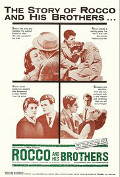
Italy 1960
Directed by
Luchino Visconti
180 minutes
Rated M
Reviewed by
Bernard Hemingway

Rocco And His Brothers
Social realism meets soap opera in this story of the breakdown of a poor Sicilian family, the Parondis, in post-war Italy who move to Milan in search of a better life. With no prospects their best hope is the second oldest brother of the five, Simone (Renato Salvatori), a bruiser with some talent as a boxer but who gets lost in the temptations of the Big Smoke and manages to drag the family into ruination.
Although the narrative core of this film is potentially gripping and one must credit the ambitious vision of the director (who won Best Director at Venice in 1960 for it), overall, the unfolding is choppy (with the editing literally so) meaning that we get the idea but not the emotion. The attempt to structure the story into five chapters, one for each brother, doesn't really come off with in general too much time spent on the banal boxing-related material and not enough on the individual characters (and when it does the latter the film is at its best) with elements such as Simone's relationship with a homosexual fight promoter only superficially touched upon (in a scene with some strange simulated television). In other respects, if Visconti captures the Southern Italian penchant for florid emoting this comes across at times as actually laughable, particularly in the form of Greek actress, Katina Paxinou, who plays the Parondi materfamilias with histrionic excess.
At nearly 3 hours whilst contemporary tastes may have regarded this as justified for an "important" film it now seems overlong (particularly the first part), despite with some considerable jumps in the narrative which supposedly unfolds over many years. Giuseppe Rotunno provides some effective photography and Nino Rota his characteristic music but these don't cover up the film's lacunae
Of the cast Alain Delon who plays Rocco, appealing as he is, is incongruously pretty in his first major screen appearance whilst Renato Salvatori who made a career during the '60s and '70s playing baddies, stands out, as does Annie Giradot as the putana who brings about his and, ultimately, the family's downfall.
It would come as no surprise to discover that Coppola had seen this film quite a few times prior to making The Godfather (1972) as their scope is very similar, even if their subject matter varies considerably..
Want something different?





